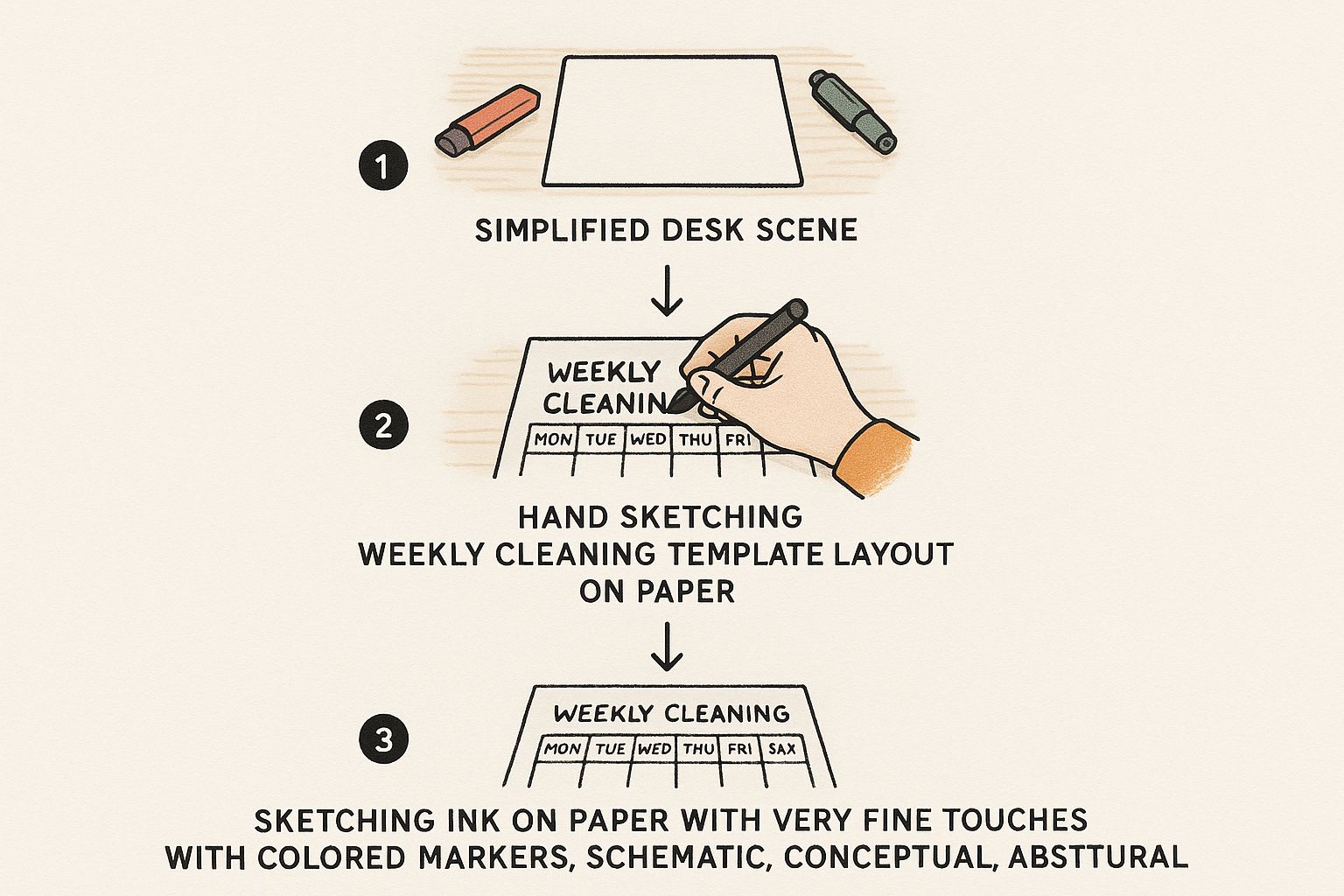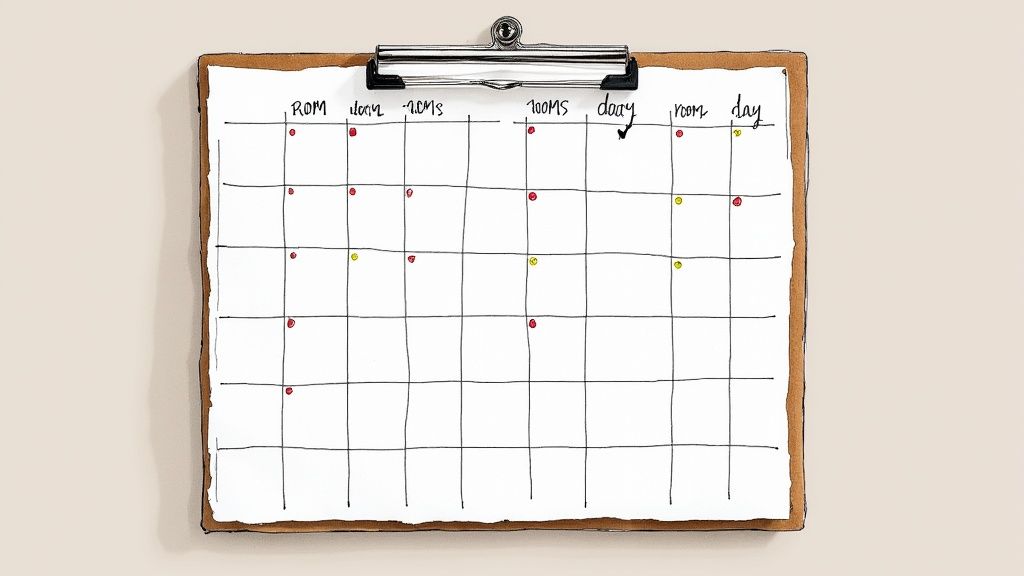Think of a weekly cleaning schedule template as your secret weapon against household chaos. It's essentially a game plan that takes all those overwhelming chores and breaks them down into small, bite-sized tasks you can tackle daily and weekly. The goal? To keep your home consistently clean without sacrificing your entire weekend to a marathon cleaning session.
How a Cleaning Schedule Can Bring Back Your Sanity
That feeling of being completely swamped by a never-ending to-do list? We've all been there. A messy, chaotic home can quietly add a lot of stress to your life, but a simple, structured cleaning routine can turn that around, transforming your space into a place of calm. Instead of dreading the mountain of chores waiting for you on a Saturday morning, a good schedule helps you build small, manageable cleaning habits into your week.
This isn't about chasing some unrealistic, show-home level of perfection. It's about finding a rhythm that actually works for you and your family. Picture this: spending just 20-30 minutes each weekday on a specific zone. Maybe Mondays are for bathrooms, and Tuesdays are for dusting and wiping surfaces. This approach stops the mess from ever getting out of hand and, most importantly, gives you your weekends back.
The Real-World Mental Health Perks of a Tidy Home
The benefits go way beyond just having a nice-looking house. When your home is clean and organised, it can genuinely help reduce anxiety and sharpen your focus – a massive plus, especially if you work from home in Oxford. It’s funny how when your physical space feels orderly, your mind tends to feel clearer and more productive, too.
It’s clear that keeping on top of housework is a major priority for many. The demand is so high, in fact, that the UK's cleaning industry has become a huge sector. Around 17% of private households now hire professional help to keep things in order, which really shows how much we value a clean home for our well-being. You can dig deeper into the UK cleaning industry statistics on Policybee.co.uk.
A great weekly cleaning schedule template doesn't just tell you what to clean; it gives you permission to stop cleaning. Once a task is done for the day, you can genuinely relax, knowing everything is under control.
At the end of the day, a schedule like this is a tool for taking back your time and mental energy. It helps you create a peaceful home where you can properly switch off and unwind.
Getting Your Custom Cleaning Template Just Right

Let's be honest, those one-size-fits-all cleaning checklists you find online rarely stick. They weren’t designed for your house, your family’s routine, or the unique chaos of your life in Oxford. The only truly effective weekly cleaning schedule template is the one you create yourself, perfectly moulded to your home’s layout and your family’s rhythm.
The best way to start is by putting on your detective hat. Take a walk through your home and really look at it. Where do the messes pile up the fastest? For most families I've worked with, it's the entryway where shoes and bags are dumped, the kitchen surfaces, and the main bathroom. These high-traffic areas are your "hotspots" and need a bit of daily attention. That spare room? It can probably wait for a quick weekly once-over.
Sorting Your Tasks: Daily, Weekly, and Monthly
Once you’ve identified your hotspots, the next step is to sort your chores into manageable chunks. This isn’t about creating a rigid, intimidating list; it’s about understanding what needs doing and when, so you never feel overwhelmed.
I find it helps to group everything into three simple buckets:
- Daily Tidies (The 15-Minute Reset): These are the small, quick jobs that stop clutter from taking over. Think wiping down kitchen counters after meals, making the beds each morning, or a quick sweep of the hallway floor.
- Weekly Cleans (The Proper Jobs): This is where you put in a bit more effort. We’re talking about things like properly vacuuming the whole house, giving the bathrooms a thorough clean, changing the bed linen, and dusting all the main surfaces.
- Monthly Deep Dives (The Big Stuff): These are the less frequent but equally important tasks that keep your home in great shape. This could be cleaning out the microwave, washing the inside of the windows, or wiping down all the skirting boards and light fittings.
Breaking it down this way gives you a clear, realistic framework. You’re no longer faced with an endless list of "things to clean." Instead, you have a structured plan that prevents small messes from turning into a weekend-long chore.
The biggest mistake people make is trying to deep-clean the entire house in one go. A good template is all about spreading the load. You assign specific, achievable tasks to different days, so you're only ever doing a little bit at a time.
A well-structured list is a great starting point. Here's a sample table showing how you can start to categorise tasks for your own home. Use it as a guide to build a schedule that feels right for you.
Sample Task Distribution by Room and Frequency
| Room/Area | Daily Tasks (10-15 mins) | Weekly Tasks (30-45 mins) | Monthly Tasks (1-2 hours) |
|---|---|---|---|
| Kitchen | Wipe counters, wash up, sweep floor | Mop floor, clean hob, wipe appliance fronts | Clean inside oven, descale kettle, wipe cupboards |
| Living Room | Plump cushions, tidy clutter, fold throws | Vacuum/mop, dust all surfaces, dust electronics | Clean under furniture, wash cushion covers |
| Bathrooms | Wipe sink & taps, squeegee shower screen | Clean toilet, shower & bath, mop floor, empty bin | Deep clean grout, wash bath mat, clean cabinets |
| Bedrooms | Make beds, put clothes away | Dust furniture, vacuum floor, change linen | Organise wardrobe, flip mattress, dust light fittings |
This table isn't a set of rules, but a foundation. You can add, remove, or shift tasks to match how your family uses each space, creating a plan that genuinely works.
Making It Fit Your Real Life
Now for the most important part: making it work for you. Grab your family’s calendar and have a look at the week. Are you full of energy on a Monday morning or is that pure chaos? Perhaps you work from home on Thursdays, making it the perfect day to tackle the weekly bathroom clean while on a lunch break. If Tuesday evenings are a rush with after-school clubs, that’s probably not the night to schedule a big job.
Getting the whole family involved is the secret to making any schedule stick. Even small children can help by putting their own toys away or helping to set the dinner table. When cleaning becomes a shared team effort instead of just one person's responsibility, the whole system feels lighter and you'll be teaching brilliant life skills along the way. The end goal is a flexible system that serves you, not the other way around.
Building a Realistic Day-by-Day Cleaning Framework
The secret to making cleaning feel less like a monumental chore is to build it into the rhythm of your week. I've found that the most successful approach, especially for busy Oxford families, is something called ‘zone cleaning’. Forget trying to clean the entire house in one go; instead, you focus on one specific area each day.
This simple shift in strategy prevents those dreaded weekend-long cleaning marathons. By giving each part of your home focused attention on a regular basis, nothing ever gets too out of hand. For example, Monday could be your dedicated bathroom day, while Tuesday is all about dusting and vacuuming. On Wednesday, you might give the kitchen a proper deep clean. It’s a game-changer because no corner is left to gather dust for weeks on end.

This visual is a great example of how you can map out your week, assigning a specific zone to each day. The real magic here is breaking the overwhelming task of "clean the house" into small, manageable chunks that you can actually achieve.
A Sample Weekly Breakdown to Get You Started
Think of this as a starting point. Feel free to move things around to fit your own life.
-
Monday: Bathrooms
Give the toilets, showers, sinks, and floors a thorough clean. Getting this done early in the week feels like a real win. -
Tuesday: Dust & Vacuum
Go through every room with a duster and the hoover. This is a maintenance task that keeps the whole house feeling fresh. -
Wednesday: Kitchen Focus
Wipe down all appliances (inside the microwave!), give the hob a good scrub, and mop the floor. -
Thursday: Bedrooms
Change the bed linen, clear any cluttered surfaces, and put away stray clothes. -
Friday: Floors & Final Tidy
A quick mop of all hard floors, tackle any spots you missed during the week, and generally prep the house for a relaxing weekend.
This structure also makes it easier to handle those never-ending tasks like laundry. Did you know that the average British household does around 6.3 laundry washes every two weeks? By slotting a load or two into your schedule on specific days, you can stop the laundry basket from overflowing. Integrating these recurring habits is what makes the whole system work. If you're curious about UK cleaning habits, YouGov has some fascinating survey results.
The best cleaning schedule is one that works for you. If your living room is the family hub and gets messy fast, maybe it needs its own dedicated day. The goal is to create a rhythm that reduces stress, not a rigid set of rules that adds to it.
Remember, life happens. If you miss a day, don't sweat it. Just pick up where you left off the next day. This is all about progress, not perfection.
Choosing Your Cleaning Tools and Supplies

Half the battle with cleaning is having the right gear on hand. Before you rush out and buy every specialised spray on the shelf, let's think about building a smart, effective toolkit. A well-chosen set of supplies is the secret weapon behind any successful weekly cleaning schedule template, ensuring you’re always ready without adding to the clutter.
The big question is often whether to go for multi-purpose cleaners or task-specific products. Honestly, you need a bit of both. A good all-purpose spray is brilliant for most daily wipe-downs, but some jobs really do need a specialist. Think about the limescale build-up you get in an Oxford bathroom or a greasy hob after cooking a big Sunday roast – a dedicated product just works better and saves you from endless scrubbing.
Curating Your Essential Cleaning Kit
You don’t need an overflowing cupboard to keep your home sparkling. Focus on a core set of high-quality basics that genuinely make a difference. Here’s what I’d recommend starting with:
- High-quality microfibre cloths: These are a must-have. They properly trap dust and dirt instead of just pushing it around, and you can use them on everything from windows to worktops.
- A reliable vacuum cleaner: Whether you prefer a powerful upright for deep cleans or a lightweight cordless for zipping around, a good hoover is your best friend.
- A versatile all-purpose cleaner: This is your go-to for quick spills and giving most surfaces a daily once-over.
The goal is to equip yourself with tools that work hard so you don’t have to. Investing in a few quality items is more effective than having a cupboard overflowing with cheap, single-use products.
This idea of smart, effective cleaning is definitely catching on. The UK household cleaner market is predicted to reach about US$1.60 billion by 2025, and there's a huge shift towards eco-friendly and sustainable options. People are looking for products with natural ingredients and less packaging, which you can read more about on Statista.com.
Of course, some messes need a bit more know-how. For those trickier jobs, our guide on how to remove stubborn stains has some brilliant tips.
Making Your Cleaning Routine Stick
You’ve got your weekly cleaning schedule template sorted. That’s a brilliant start, but the real challenge—and where the magic happens—is making it a habit. The aim isn't just a tidy home this week; it's about creating a system that genuinely works for you and your family month after month.
This is where a few simple, powerful mini-habits can make all the difference. Think of them as the glue that holds your schedule together, stopping those little messes from snowballing into weekend-destroying chores.
Weave in Some Powerful Mini-Habits
Two of my absolute favourite habits are the '15-minute nightly reset' and the 'one-touch rule'. The nightly reset is exactly what it sounds like: a quick blitz before bed. You'd be amazed what you can get done in just 15 minutes – clearing kitchen counters, putting cushions back, and getting things ready for the morning.
The 'one-touch rule' is even simpler but just as effective. Instead of dumping the post on the table to sort later, you deal with it immediately. When you take your coat off, you hang it up straight away. These tiny actions are your secret weapon against clutter.
Life in Oxford gets hectic, and let's be honest, perfection is impossible. The real key here isn't about ticking every single box every single week. It's about consistency over perfection. Your schedule is a guide, not a stick to beat yourself with.
Keep Your Schedule Fresh and Relevant
Life changes, and your cleaning schedule should change with it. The routine that works perfectly now might not fit in six months' time, especially with kids' activities or work commitments shifting. Plan to give your template a quick review every few months to make sure it still makes sense.
- Plan for the Big Jobs: Don't let huge tasks derail your weekly rhythm. Schedule those seasonal deep cleans—like washing the windows or deep cleaning the carpets—on a separate calendar. Blocking out one weekend a quarter usually does the trick.
- Be Flexible: Sometimes life just gets in the way. If you miss a task or even a whole day, don't sweat it. Just pick back up when you can. This is supposed to reduce your stress, not add to it.
At the end of the day, making your routine stick is all about building a system that feels supportive, not punishing. And for those times when a seasonal clean feels overwhelming or you just need a proper reset, remember you can always get some help. It's easy enough to look into booking a professional clean in Oxford to get your home back to a brilliant baseline.
Your Cleaning Schedule Questions, Answered
Even with the perfect template, you're bound to run into a few real-world snags. That's completely normal when building a new habit. Let's walk through a couple of the most common questions we hear from busy Oxford households.
How Can I Get My Family or Flatmates to Help?
This is the big one, isn't it? Getting everyone on the same page can feel like an uphill battle, but the key is to make it a team effort.
Instead of just handing down a list of chores, sit down and create the schedule together. This simple shift gives everyone a sense of ownership. A great little trick I've learned is to let people pick the jobs they least despise. Someone might not mind cleaning the loo but hates doing the washing up – it’s an easy win.
With kids, a classic reward chart is still surprisingly effective. For flatshares, agreeing on who does what and sticking the schedule on the fridge acts as a constant, gentle nudge.
A cleaning schedule is a tool for teamwork, not a source of tension. A quick, friendly check-in each week works far better than constant nagging. It keeps everyone accountable and the atmosphere positive.
What Happens When I Inevitably Fall Behind?
Life happens. A busy week, an unexpected deadline, or just feeling a bit under the weather can throw your whole schedule off. The most important thing? Don't panic.
Whatever you do, don't try to cram a week's worth of missed chores into a single day. That's a surefire recipe for burnout. Just pick up where you are on the current day and move forward. The world won't stop spinning if the hoovering is a day late.
If you're feeling completely swamped, just focus on a few "reset" tasks. Wiping down the kitchen surfaces, getting one load of laundry done, and a quick clean of the bathroom can make a huge difference. Remember, your schedule is a guide, not a contract. For more home maintenance tips, have a look at the helpful articles on the Signal Cleaning blog.
When life just gets too hectic, let the professionals take the weight off. Book your next clean with Signal Cleaning at https://signalcleaning.co.uk.
